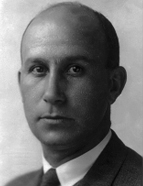

Luís de Pina, the name he chose for his public life, was the son of Captain Luís Augusto de Pina Guimarães. He was born on 24 August in Luanda, the city where his father served as a army officer and where Luís spent his childhood. When his father retired from military life in 1910, the family returned to their ancestral roots in Guimarães. Here Luís received his secondary school education in the Liceu Central in Braga, the Liceu Central in Guimarães and the Martins Sarmento Society, a local cultural institution. Here his interest in historical, archaeological and cultural studies in general can be seen since he frequently consulted the Society’s famous Library and Archive. From his father he inherited a love of art and drawing which would continue till the end of his life as well as a love of caricature and sculpture. He also shared his father’s passion for the history of Guimarães, a recurring topic in his first academic research projects.
Luís de Pina had a great desire to study medicine so, after he had attended the necessary preparatory courses in the Faculties of Science of both Coimbra and Porto Universities, he matriculated in the University of Porto in 1922, where as a student he stood out for his pro-active organisation of and involvement in numerous academic and cultural activities. He finished his degree in 1927 with distinction in a course of excellence that would come to be called the “course of the five lecturers”. In the same year he was invited to join the teaching body at the Faculty as a Second Assistant Lecturer in Anatomy after serving a voluntary internship in the Institute of Anatomy with Professor Joaquim Pires de Lima, where he used his artistic skills to produce iconographic material for the teaching of medical matters. This master later invited him to take on further duties as Head of Service of the Criminal Anthropology, Experimental Psychology and Civil Identification Office of Porto which came under the Ministry of Justice (1929), where he was responsible for important internal organisational reforms. He was also a member of the state committee set up to evaluate the archaeological site of Citânia de Briteiros (a pre-Roman fortified settlement).
On 6 March 1930, encouraged by the Academic Board of the Faculty of Medicine of Porto, he defended his doctoral thesis Vimaranes: materiais para a história da medicina portuguesa, (Vimaranes: material for the history of Portuguese medicine), a study of an anthropological, archaeological, ethnographic and historical nature about Guimarães. He focused on its medical history through the inventory and analysis of unpublished documents collected from the archives of the Municipal Council, the Misericórdia and religious orders which were all in the possession of the Martins Sarmento Society. Following the pioneering tradition that the history of Portuguese medicine enjoyed in this Porto school, to which he himself would pay homage by dedicating his work to such figures as Gouveia Osório, Maximiano de Lemos and João de Meira, he chose his main field of knowledge in a work in which he proposed to complete the chapter on local medical history from pre-history to the early 1800s.
